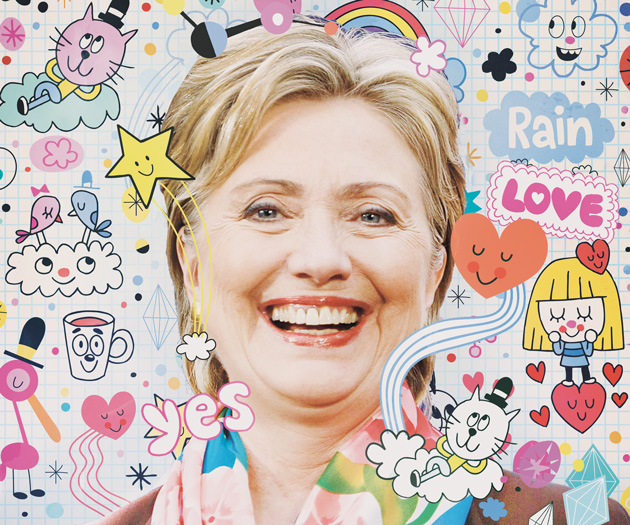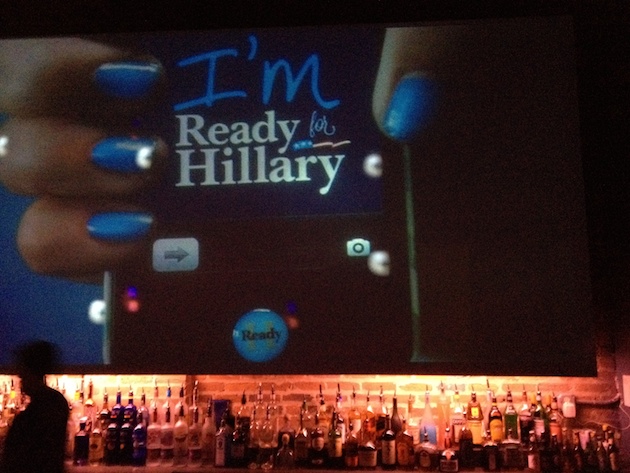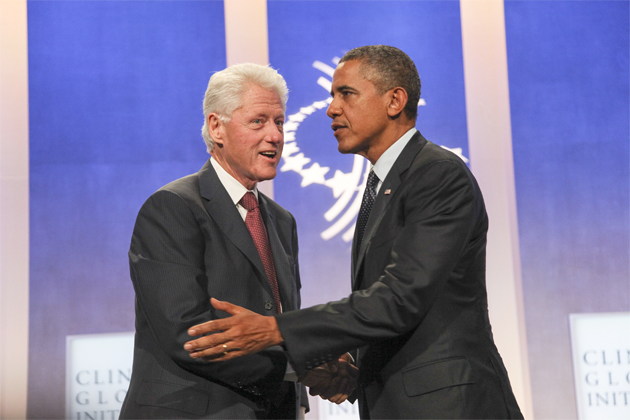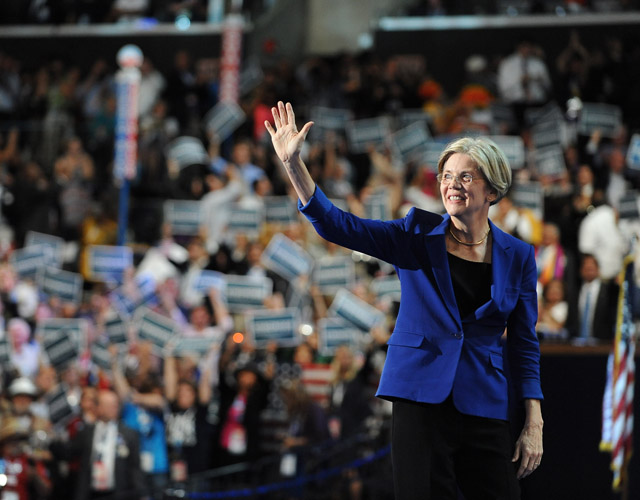
He’s a 28-year-old reserve police officer completing a bachelor’s degree in criminology at Virginia’s George Mason University. She’s a 62-year-old Eleanor Roosevelt scholar and history professor at George Washington University in DC. Adam Parkhomenko and Allida Black are unlikely friends; they are the even unlikelier masterminds of Ready for Hillary, a super-PAC that has risen from ragtag origins to become a central component of Hillary Clinton’s shadow presidential campaign-in-waiting.
Parkhomenko and Black fall well outside the Clintons’ rarefied inner circle of advisers, consultants, fundraisers, and confidantes. Both are Hillary superfans who until very recently were political neophytes. Yet since cofounding Ready for Hillary in January 2013, they’ve managed to raise $4 million, which they are channeling into building a massive database of supporters and volunteers that will become the foundation for Clinton’s presidential run if she jumps into the race. (Within the Ready for Hillary world, there’s little doubt that leap will come.) Parkhomenko and Black have also attracted key Clinton aides and allies to their super-PAC and thus have obtained the unofficial blessing of the Clintons themselves. These two groupies have worked their way backstage to hang out with the band.
Parkhomenko and Black first met in 2003 at a Halloween party hosted by Jim Turpin, then-chair of the Arlington County Democrats in Virginia. Parkhomenko was a 17-year-old community college student then, but he was already a Hillary Clinton crusader. That fall, he had created a website, VoteHillary.org, featuring a petition urging Clinton to enter the 2004 presidential campaign. It garnered over 100,000 signatures.
“I liked him,” Black recalls of that first encounter, “because he pushed back with confidence and not with arrogance, which for a 17-year-old is a stunning feat.” The two established a close rapport, even though Black found his notion of online organizing a tad naive. “She’s been one of my best friends since I met her,” Parkhomenko says. “We clicked.”
Parkhomenko’s online campaign failed to sway Clinton, but the effort got him noticed. He earned a Washington Post Magazine profile from Mark Leibovich. A framed copy signed by Clinton (“Adam—Thanks for believing!”) now hangs in Parkhomenko’s Ready for Hillary office.
Parkohmenko’s pro-Hillary fervor also drew attention from Hill PAC, Clinton’s political action committee. In December 2003, the group reached out to ask if he wanted to volunteer for the PAC. He accepted the invitation, put his community college classes on hold—”Hillary would always ask about school, just as much as my mom,” he says—and soon worked his way up to full-time staffer.
Hill PAC was a small operation, merely four or five employees, and Parkhomenko split his time between the PAC and Friends of Hillary, Clinton’s Senate reelection committee. He worked advance for Clinton events, wrote thank-you notes, and handled scheduling. He had been brought in by Patti Solis Doyle, a longtime Clinton hand—she worked as Hillary’s scheduler in 1992—who oversaw the PAC and the election committee. Solis Doyle referred to Parkhomenko as her “chief of stuff.”
When Clinton announced her bid for the presidency in 2007, Solis Doyle was tapped as her campaign manager. Parkhomenko became Solis Doyle’s assistant—the gatekeeper to the gatekeeper of the presidential candidate. Parkhomenko was known throughout the campaign as Solis Doyle’s right hand, which came back to bite him when Solis Doyle was fired in early 2008. Solis Doyle exited the campaign in February and Parkhomenko left soon thereafter. He was 22 years old.
Parkhomenko couldn’t quite shake the Hillary bug. He created another pro-Hillary website that spring, VoteBoth.com, to encourage Clinton supporters to goad Obama into picking Clinton as his running mate. After that failed, Parkhomenko took a break from politics. He reenrolled at Northern Virginia Community College in the fall of 2008 and became a reserve police officer in Washington, DC. But he quickly returned to the political fold. In 2009, he ran for an open House of Delegates seat in Arlington, ultimately finishing third in a five-way race. After that, he buckled down on completing his college degree, later transferring from community college to George Mason University.
Though he lost touch with his old Clinton coworkers, Black and Parkhomenko remained close. He had moved into her spare bedroom during the 2008 presidential campaign after Black insisted that he not waste money on rent while living on a campaign staffer’s salary.
By the time of her first encounter with Parkhomenko, Black already had a couple decades of experience in politics and policy. One of her early brushes with politics came in 1973, during her final year of undergrad at Emory University, when she ditched classes for a full-time internship with then-Gov. Jimmy Carter’s Commission on the Status of Women. She stuck around Atlanta after college, running a center for the city’s gay residents. “When AIDS struck,” she says, “it was pretty cataclysmic for me. I lost every male friend I had in Atlanta, including all the volunteers who worked for me at the gay center and tons of the kids I worked with who had runaway from home and were sexually abused.” In 1988, she moved to DC to begin a Ph.D. program in history at George Washington University.
She would go on to teach at Franklin & Marshall, Penn State University-Harrisburg, Gallaudet University, and other schools before landing back at George Washington. She focused her studies on Eleanor Roosevelt, not for her role as a first lady but for her later work pushing human rights issues around the world. Black doesn’t see much coincidence in the fact that her two political idols both happened to be the spouse of a president. “There are obvious comparisons, but there are obvious differences,” she says. “Eleanor did a little policy; Hillary was born to do policy. Eleanor helped introduce and build a modern human rights movement, and Hillary has taken it into places that Eleanor only dreamed it would reach. There are leadership parallels and there are vision parallels, but I come to Eleanor not really as a first lady. I come to her as a party leader and as an architect of human rights.”
Black has published 10 books, mostly collections of Eleanor Roosevelt’s writings. She edited a book of academic essays titled Modern American Queer History. Michelle Obama penned the introduction to Black’s 2009 book, The First Ladies of the United States of America.
She has closely watched Clinton’s career long before she became first lady. “I started hearing about Hillary in ’75,” she says. “I knew she was on the Watergate judiciary committee staff, but what I kept hearing about was the work that she had done for legal aid and the work that she had done for kids.” On her meager grad school stipend Black chipped in $35 for Bill Clinton’s 1992 campaign. “I was for Bill because of Hillary,” she is fond of saying.
During the 1990s, Black intermittently interacted with the White House. Staff would periodically call to ask for Eleanor Roosevelt quotes for use in speeches. She gave a presentation on Roosevelt to the President’s Commission on the Celebration of Women in American History, a panel convened by Bill Clinton. She eventually became a consultant to the group. Black received seed money from the commission for the Eleanor Roosevelt Papers Project, a program she oversaw at George Washington that researched the former first lady’s writings on human rights. Hillary Clinton sat on its advisory board, but played a minimal role. Black recalls Clinton phoning her students twice to offer encouragement during the early 2000s, and Clinton headlined one fundraiser for the project.
In 2008, Black tapped into her retirement fund to travel across the country as a Clinton volunteer, hitting 14 states to stump for the former first lady. She wore the same pair of bright orange Nike high-tops everywhere she went, which Clinton later autographed. Black was among the Hillary supporters who protested outside Democratic National Committee meetings to get Clinton’s delegates from Michigan and Florida seated.
The 2012 election was a few weeks old when Parkhomenko phoned Black with an audacious plan to boost the presidential prospects of their political idol. He floated the idea of forming a pro-Hillary super-PAC with a name that summed up their sentiments: Ready for Hillary. Unlike other super-PACs, which gather millions to bankroll political ads, Parkhomenko envisioned using the group to revitalize Clinton’s now-outdated voter, volunteer, and donor databases. The idea was to gather the names of the Hillary devotees, effectively creating Hillary’s version of Obama’s Organizing for America.
Black was instantly taken with the concept. They decided to market Ready for Hillary as a grassroots group of normal voters. They didn’t want the image of fat cat donors that defined super-PACs in 2012, so they capped contributions at $25,000.
When Parkhomenko and Black launched Ready for Hillary in January 2013, they worked out of Parkhomenko’s living room and enlisted their significant others to help out. Parkhomenko’s girlfriend, Kirby Hoag, is Ready for Hillary’s deputy operations manager and Black’s wife, Judy Beck, is the group’s treasurer. Few people took them seriously at first. They were viewed more as a novelty than a true part of Clinton’s campaign-in-waiting.
Ready for Hillary’s cofounders may have lacked Clintonland clout, but they knew the right people to call. First, Black contacted Ann Lewis, the former White House communications director and a senior adviser to Hillary’s 2000 Senate bid. Lewis was a member of the Clinton-era Celebration of Women in American History commission and has stayed friends with Black since. Shortly after the super-PAC was formed, Black pitched Lewis on Ready for Hillary over lunch at Washington’s Mayflower Hotel. “She told me that she and Adam had this plan to build the database for Hillary,” Lewis says. “As soon as she said it, I knew it was the right thing to do. I know how fast voter lists can degrade, how important it is to have a really good list.” By the time the bill arrived, Lewis had handed Black a $500 check. This was the first contribution to Ready for Hillary.
Next came Susie Tompkins Buell, one of Hillary’s closest friends and a major Democratic donor whose fortune derives from Esprit, the clothing company she founded. (She’s also a donor to Mother Jones.) Black befriended Buell in Indiana during the 2008 campaign, when the two found themselves in the same pack of Clinton door-knockers and they’ve remained email buddies ever since. Buell offered her support and advice on operating an online store, which has since become a major fundraising and branding tool for the super-PAC. In 2013, Ready for Hillary pulled in $350,000 just by peddling Hillary swag, including mugs, iPhone cases, and onesies. The hallways of Ready for Hillary’s office are lined with boxes of merchandise waiting to be boxed and shipped out—a task that falls to a lone staffer. In the week before Christmas, Ready for Hillary sent out over 1,000 packages.
Though some in Clinton circles eyed the upstart organization warily, Buell’s endorsement was a tacit sign of approval. And as other pro-Hillary super-PACs began to crop up, Ready for Hillary emerged as the clear choice for Clinton insiders. Last spring, Craig Smith, Bill Clinton’s former White House political director, joined Ready for Hillary as a senior adviser. “My instinct was that it was somewhat problematic to have just a whole plethora of these things out there raising money, using her name,” he says. “My sense was that it would be better if there was just one.”
Smith, whose firm is paid $10,000 a month by the PAC, serves as an experienced hand guiding Parkhomenko, the super-PAC’s executive director. The two talk on the phone everyday. “There is some concern that this is starting the [campaign] early, which is a legitimate concern,” Smith says. “But in the modern age of politics it takes forever to build a big list of people, you can’t just do it overnight.”
Support from Clinton insiders ramped up after Smith came on board. Steve and Amber Mostyn (two of the largest Democratic donors in 2012) joined Buell to co-chair Ready for Hillary’s finance council. Democratic megadonor George Soros, Jill Iscol (vice-chairman of Clinton’s 2008 finance committee and a bankroller of her two senate bids), and many other Democratic heavy hitters subsequently joined the finance council. Meanwhile, longtime Clinton political strategist James Carville jumped in to assist with fundraising. “We need to convert the hunger that’s out there for Hillary’s candidacy into a real grassroots organization,” he wrote in a fundraising appeal to the group’s supporters.
Ready for Hillary attracted endorsements from a range of Democratic politicians, including Sen. Claire McCaskill (D-Mo.), Rep. Tim Ryan (D-Ohio), Rep. Dina Titus (D-Nev.), and Minnesota Gov. Mark Dayton,. Former Michigan Gov. Jennifer Granholm joined Ready for Hillary as an adviser and serves as the group’s cable news surrogate.
Only a year after starting up in Parkho’s living room, the super-PAC now occupies a suite of fifth-floor offices in downtown Arlington, Virginia. The group has an 18-person staff, with plans to expand to 25 in the coming months. The current staff includes employees focused on organizing various voting blocs: LGBT, Latinos, women, blacks, youth. To oversee its field operations, Ready for Hillary hired 270 Strategies, a group founded by Jeremy Bird and Mitch Stewart, veterans of Obama’s 2012 campaign.
Ready for Hillary has become an essential part of an elite cadre of outside groups that will buttress Clinton’s expected candidacy, which includes Priorities USA, the pro-Obama super PAC that announced in January that it will be redirecting its efforts to support Hillary. There’s also Correct the Record, an offshoot of David Brock’s American Bridge, which will be repurposed to combat conservative attacks on Clinton and spread opposition research on her possible opponents.
These groups overlap. Priorities is co-chaired by Granholm, one of Ready for Hillary’s main boosters. Brock gave a November presentation on possible right-wing attack points at Ready for Hillary’s national finance council meeting in New York. Together, the three outfits form a full campaign infrastructure: voter list development (Ready for Hillary), ad buying (Priorities), and rapid response (Correct the Record).
All of Ready for Hillary’s work is building toward the moment when Clinton will, as Black and Parkhomenko assume, officially announce her candidacy. At that point, the two plan to shut down Ready for Hillary or reorient its mission. Either way, Ready for Hillary plans to spend down most of its funds by that point. “We’re not going to have millions and millions of dollars,” says Seth Bringman, the group’s communications director. “We’re going to have millions and millions of supporters.”
The idea is that once Hillary Clinton declares, Ready for Hillary will hand over the database it has been methodically compiling and curating. Due to campaign finance regulations, it can’t fork over the information for free, but there are workarounds. Ready for Hillary can sell or lease its database to the Clinton campaign for a fraction of what it cost the group to build. That list will allow Clinton to hit the ground running, immediately able to identify the people most likely to canvass and volunteer for her campaign. In the meantime, Ready for Hillary is training its supporters on the essentials of campaigning: how to host house parties, register voters, and solicit contributions.
Whatever the future holds for Ready for Hillary, the effort has elevated Black and Parkhomenko from mere fans to key players in the Clinton machine. Black now works alongside assorted Democratic heavy hitters. And Politico, the bible of the Beltway’s political class, recently included Parkehmenko on its list of “Hillary Clinton’s 50 influentials.” He ranked 46th, but that wasn’t so bad for a DC reserve cop.
This story has been corrected.


















